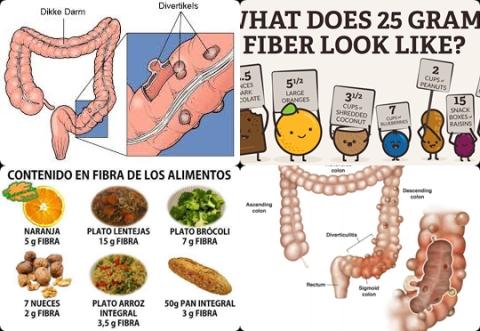
Objectives:
A high intake of dietary fibre has been associated with a reduced risk of diverticular disease in several studies. However, the dose-response relationship between fibre intake and diverticular disease risk has varied and the available studies have not been summarised in a meta-analysis yet. Therefore, this review article (meta-analysis) has been conducted.
Is there a dose-response relationship between fibre intake and reduced risk of diverticular disease?
Study design:
This review article included 5 prospective cohort studies with 19,282 cases (persons with a diverticular disease) and 865,829 participants.
There was no evidence of publication bias with Egger's test, p = 0.58.
Results and conclusions:
The investigators found every 10 g/day increase of dietary fibre intake significantly reduced risk of diverticular disease with 26% [summary RR = 0.74, 95% CI = 0.71-0.78, I2 = 0%]. This significantly reduced risk persisted in subgroup and sensitivity analyses.
The investigators found no evidence of a nonlinear association between dietary fibre intake and diverticular disease risk [p nonlinearity = 0.35].
The investigators found compared to 7.5 g/day, 20 g/day of dietary fibre intake significantly reduced risk of diverticular disease with 23%.
The investigators found compared to 7.5 g/day, 30 g/day of dietary fibre intake significantly reduced risk of diverticular disease with 41%.
The investigators found compared to 7.5 g/day, 40 g/day of dietary fibre intake significantly reduced risk of diverticular disease with 58%.
The investigators found every 10 g/day increase of dietary cereal fibre intake significantly reduced risk of diverticular disease with 26% [summary RR = 0.74, 95% CI = 0.67-0.81, I2 = 60%, n = 4].
The investigators found every 10 g/day increase of dietary fruit fibre intake significantly reduced risk of diverticular disease with 44% [summary RR = 0.56, 95% CI = 0.37-0.84, I2 = 73%, n = 2].
The investigators found every 10 g/day increase of dietary vegetable fibre intake non-significantly reduced risk of diverticular disease with 20% [summary RR = 0.80, 95% CI = 0.45-0.1.44, I2 = 87%, n = 2].
The investigators concluded that 10-40 g/day dietary fiber intake, particularly cereal and fruit fibre reduces risk of diverticular disease. However, further studies are needed on fibre types and risk of diverticular disease and diverticulitis.
Original title:
Dietary fibre intake and the risk of diverticular disease: a systematic review and meta-analysis of prospective studies by Aune D, Sen A, […], Riboli E.
Link:
https://www.ncbi.nlm.nih.gov/pubmed/31037341
Additional information of El Mondo:
Find here more information/studies about chronic disease and fibre intake.
40 grams of fiber per day corresponds to a diet with 2 grams of fiber per 100 kcal. The easiest way to follow a diet with 2 grams of fiber per 100 kcal is to choose only products/meals with 2 grams of fiber per 100 kcal. Check here which products/meals provide 2 grams of fiber per 100 kcal.
Diverticular disease is the general name for a common condition that causes small bulges (diverticula) or sacs to form in the wall of the large intestine (colon). Although these sacs can form anywhere in the colon, they are most common in the sigmoid colon (part of the large intestine closest to the rectum). The recent literature does not identify diverticular disease as a long-term risk factor for colorectal cancer.